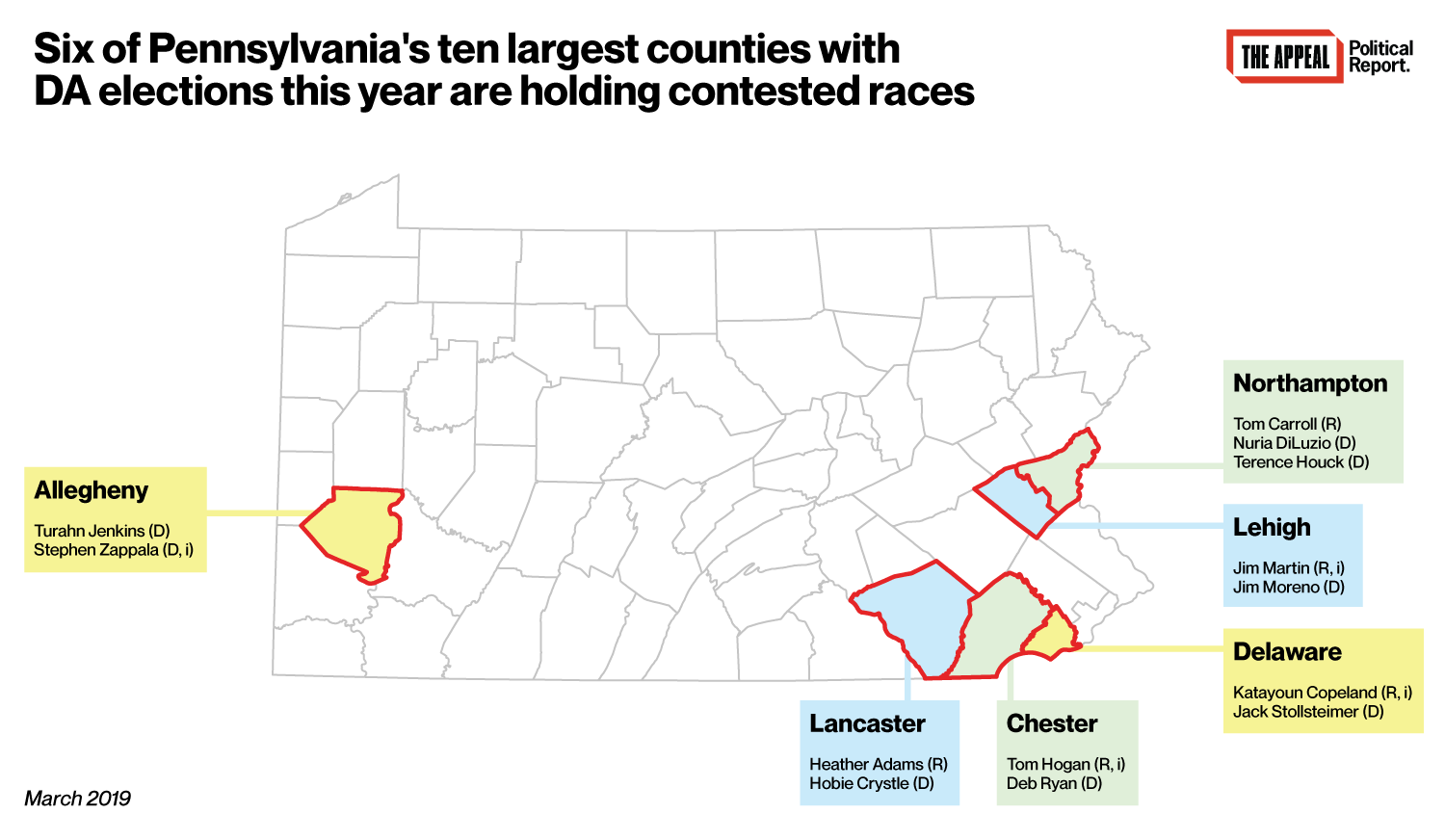Political Report
Pittsburgh’s DA Election Showcases ‘Fundamental Disagreement’
Allegheny County District Attorney Stephen Zappala faces Turahn Jenkins, his first opponent in two decades, on Tuesday.

Allegheny County DA Stephen Zappala faces his first opponent in two decades on Tuesday
Visit our broader coverage of the 2019 elections here.
Allegheny County District Attorney Stephen Zappala told the Pittsburgh Post-Gazette in May that his re-election race was marked by a “fundamental disagreement as to what the office of the district attorney is supposed to be.” That much is indisputable.
Tuesday’s Democratic primary has become a showcase of the political fault lines that are fueling different approaches to the role of prosecutor today. It opposes Zappala, who has been in office since 1998, to Turahn Jenkins, the county’s former chief public defender as well as a former assistant DA. (The winner is sure to face no Republican in the general election, but candidates outside the two main parties could still file to run up until August.)
According to Zappala, what’s at stake in this disagreement is whose side a DA is on. “Socialists focus on the rights of the accused,” he said. (The Pittsburgh Democratic Socialists of America have recommended voting for Jenkins.) “There’s no consideration for victims’ rights. They don’t consider public safety. They don’t consider input from the police. … I’m not running for public defender. I represent the people of the Commonwealth of Pennsylvania.”
What stands out in Zappala’s statement is the very premise that there is an easy split between defendants’ rights and victims’ rights, and that a DA must pick one or the other.
Given Pennsylvania’s sky-high incarceration rates and the racial disparities in the county’s legal system, this split obscures the role that DAs play in shaping the livelihood of entire communities, and it downplays just how many lives DAs impact based on how they use their tremendous discretion. Not to mention, the line between victim and accused is just not that self-evident.
The outlook that Jenkins, Zappala’s challenger, has laid out during the campaign is instead that the legal system as a whole is not functioning, and that this affects a broad swath of residents. “I’m finding that no matter where I go, there’s someone who has been adversely affected by the criminal justice system,” he told the Pittsburgh Current. He called this system a “black hole.” “It’s really easy to fall into it and very difficult to get out,” he said.
This competing perspective, then, is that many of the individuals who comprise “the people of the Commonwealth of Pennsylvania” are harmed rather than represented by its legal system.
The Appeal has documented that Allegheny County’s legal system disproportionately targets African Americans. More than 80 percent of the minors who were charged as adults by Zappala’s office in 2016 and 2017 were Black, for instance, even though about 20 percent of the county’s 14- to 17-year-olds are Black.
I asked Zappala’s campaign how he explains these disparities, and whether he would change his practices to reduce them. Zappala answered in an email via a spokesperson that racial disparities are “catalyzed” by problems like poverty, and a lack of affordable housing or healthcare, which “disproportionately afflict the black community,” and which exceed what DAs can affect. The “criminal justice system… plays its part in weaving the blanket of racial bias,” he said, but “is merely one part of a vast and flawed complex adaptive system.” His response only mentioned two specific policies, first that he would “continue to advocate” for diversionary courts, and second that racial bias can be alleviated by changing how judges instruct juries.
Zappala has also said elsewhere that there is only so much his office can do, since the responsibility for inequalities in the criminal legal system is diluted. “The criminal justice system can’t fix this—not by ourselves,” he told the Post-Gazette.
But Zappala does have influence at the statewide level. He is a member of the executive committee of the Pennsylvania District Attorneys Association (PDAA), a group that lobbies for legislative change in the name of state prosecutors. The PDAA typically uses its sway to ask for more punitive policies, I documented in December. Jenkins told me at the time that, if elected DA, he may withdraw from the PDAA because their “views and policies” are “partly responsible for many of the issues that plague our criminal justice system.”
Besides intervening in legislative debates, DAs have ample discretion to overhaul intracounty practices, if they so choose. This is increasingly evident around the country as well as elsewhere in Pennsylvania.

In a Political Report interview published in April, Joshua Vaughn pressed Jenkins on how he would change county policies if elected. “I think we need to shift our efforts to restoring people, not punishing them,” Jenkins said. He stated his opposition to the death penalty (which Zappala has sought), and his support for making it harder to try minors as adults.
Jenkins also said that he would reduce arrests for low-level offenses like marijuana possession by diverting cases “before they enter the criminal justice system.” He has said elsewhere that current approaches to diversion are too punitive because they often rely on first arresting individuals or obtaining convictions. “Once they’re in the criminal justice system, the damage is already done,” he told the Post-Gazette. I inquired into Zappala’s view on diversion programs that don’t require filing charges or obtaining a guilty disposition. He answered by email via a spokesperson that he “strongly [believes] in evidenced based practices that can eliminate criminal activity, divert people to treatment and support over incarceration and reduce the burden the criminal justice system places on defendants.”
In his interview with the Political Report, Jenkins stopped short of supporting some important reform paths. He said he was open to prosecuting some overdose cases as homicides, a punitive approach to which Zappala and other Pennsylvania DAs have turned in response to the opioid crisis. Also, he indicated no plans to simply drop some types of cases (as opposed to expecting people to complete diversionary steps). Other prosecutors have implemented that bolder move.
In 2018, shortly after announcing his candidacy, Jenkins told community members that being gay or trans was a “sin,” which immediately frayed his relationship with local activists. Jenkins later apologized, and the Current reported in April that he had repeatedly met with LGBTQ rights advocates and rebuilt some of those ties. Pittsburgh DSA addressed this dynamic at some length when it issued its recommendation.

Another issue that unfolded during the campaign is Zappala’s prosecution of police officer Michael Rosfeld, who shot and killed Antwon Rose II in June. Rosfeld was acquitted in March, and Jenkins has criticized Zappala’s handling of the case. Zappala has long faced protests over his handling of cases involving police. The Post-Gazette found in June that Zappala had brought no charge in 18 of 22 police homicide cases over the course of his tenure. In March, Jenkins told the Political Report that the DA’s office should “perhaps” have referred more such cases to the attorney general.
Given the scale of the candidates’ disagreements, you would be forgiven for assuming that the county’s DA elections have historically been hotly contested. But Jenkins is Zappala’s first opponent since 1999. Zappala faced no challenger in four consecutive re-election bids—not in 2003, not in 2007, not in 2011, and not in 2015.
Still, in his first contested race in two decades, Zappala has skipped multiple candidate forums. “I’m done with socialists and ACLU forums,” he told the Post-Gazette. “I don’t agree with their philosophy on a lot of things.”
 This election is one of many contested DA races happening in Pennsylvania this year. Read the Appeal: Political Report’s statewide primer here.
This election is one of many contested DA races happening in Pennsylvania this year. Read the Appeal: Political Report’s statewide primer here.
Democrats are also holding a contested DA primary in Northampton County on Tuesday, May 21. Read the Appeal: Political Report’s preview of that primary from earlier this year.
